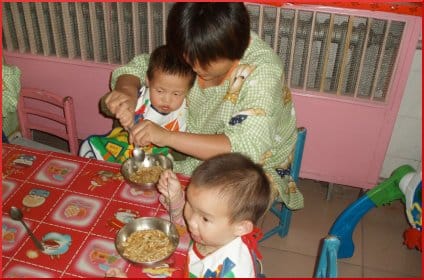
In China, as elsewhere in the developed world, there is a very strong correlation between people spending most of their time with a TV or computer and people whose bodies don’t fit into clothes or airplane seats. With kids, the situation is especially serious because the earlier obesity sets in, the harder it is to escape.
For kids in China, the deck is stacked against them. Each couple can only have one child, so the entire parental impulse to be indulgent is concentrated on that one, giving rise to what has been called the “Little Emperor” generation. Grandparents and great-grandparents still remember the late 1950s, when millions of their fellow citizens died of starvation. They grew up eating every available bite of food, because another bite might not come along for a while. The tough, militant and long-lasting Communist regime was not particularly sympathetic to obesity. But then China became wealthy, urbanized and fat.
Alarming annual increase
In recent years, the country’s medical infrastructure has been threatened by the emergence of millions of kids suffering from diabetes, cardiovascular problems, high blood pressure and other obesity-related conditions. At the turn of the century, one-tenth of the city-bred children were overweight or obese, and the child obesity rate was growing at 8% annually. Childhood Obesity News has been looking at China’s Internet addiction camps, which treat one cause of obesity in the young. At the same time, straightforward anti-obesity camps existed too.
In the fall of 2000, a military-style boot camp called Jin Duoba was established in a Beijing park. It wasn’t residential, but kids had to report for duty by 6 a.m. and put in a full day of vigorous exercise. Damien Mcelroy described the situation in Britain’s Telegraph:
At the camp, children as young as five are given military fatigues and T-shirts that read “Fat Camp” and are then subjected to the strictures of a drill master…. [G]roups of puffing recruits are put through their paces — kicking and punching the air, wriggling through tunnels and swinging across ponds on ropes. The chubby children are then taken on organized jogs around the park’s paths…. Amid loud explosions the youngsters are forced to crawl beneath barbed wire under simulated fire.
In the fall of 2009, news outlets carried a story about a rehab center for “Web addicts” at a Beijing army base. It held about 70 youth between 15 and 19. Recruited through force or deception, they would be in for a minimum three-month stay. The center’s director, Tao Ran, also employed psychiatrists and insisted that parents take part in programs too. In response to publicity about this facility, an anonymous Web commentator with the handle “tokyoahead” took the opportunity to add some local color:
Regularly, on Chinese new year, where sweets and food are even more popular than anyhow already in Chinese daily life, thousands of kids are admitted to hospital because of digestion trouble. When the Chinese Zodiac of the “golden pig” had its turn … a Hong Kong newspaper had a picture of a hospital in China that was completely overcrowded with fat little kids on its front page with the headline “The year of the Golden Pig(s)!”
Millions of children and teens were going, metaphorically, off the rails and into the woods. They were supposed to be attending school and studying diligently for the all-important college eligibility tests that would determine their entire futures. Instead, they were dropping out, playing online games and ballooning to enormous size. They disrespected and disgraced their parents, so it was a family problem. They added a terrible burden to the health-care system, so it was a massive public problem. Childhood obesity had to be attacked directly, with “fat camps,” or indirectly, with “Web addiction camps” that battled one of the main causes of obesity.
Tao Ran took a relatively enlightened approach, bringing parents into the therapeutic environment and planning the center’s treatment methods with the help of psychiatrists. But that was in the capital. Meanwhile, in Shandong province, another Web addiction facility garnered criticism for using electric shock treatment as aversive therapy to make kids want to quit the Internet. Faced with so much negative publicity, that place is said to have changed its ways.
Question: Are these extreme methods justified, and would they work in America?
Your responses and feedback are welcome!
Source: “China’s children to fight obesity at ‘Fat Camp,’ ” Telegraph.co.uk, 09/24/00
Source: “Chinese ‘Web addicts’ get boot camp, therapy,” IDG.no, 09/07/09
Source: “Chinese ‘Web Addicts’ Get Boot Camp, Therapy,” slashdot.org, 2009
Image by Andy Eick

 FAQs and Media Requests:
FAQs and Media Requests: 











